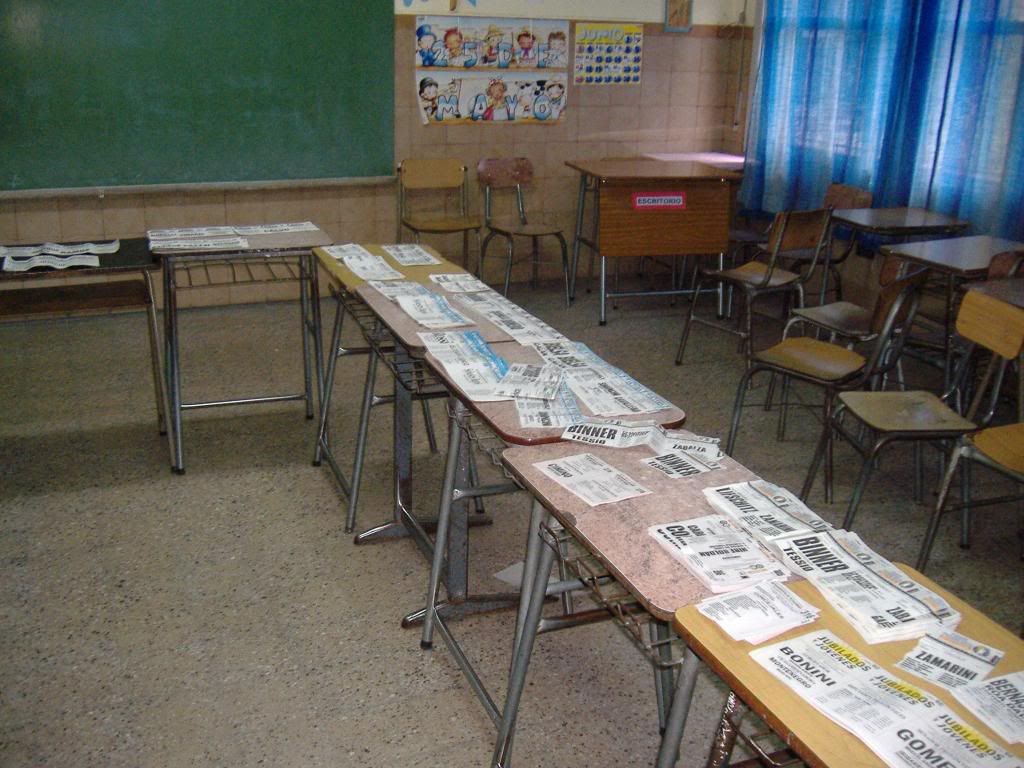
Yesterday's election brought some unexpected things. A lot of people went to vote, more than 70%. You'd think a compulsory election (under the threat of jail for those who don't attend) should not be skipped by 30% of the voters, but given the complete lack of enforcement of the electoral law and the fact that many people didn't actually know who or what they were voting for (the system is new, a bit confusing, and a lot of people are indifferent to politics when not simply dumb), it was a success — the rate of attendance was about the same as in most main elections in the recent past. On the other hand, blank and voided votes were a lot as well, about 17%. The profusion of ballots of different lengths and the possibility of cutting them to combine candidates from different parties and factions probably contributed to the confusion.
The real surprise, however, was Binner's loss. The Socialist governor candidate believed (as we all did, based on surveys) he was going to get more votes than the two Peronists combined, which would make victory in September almost a certainty; but he gathered about 30,000 votes less than the total of Rafael Bielsa and Agustín Rossi. Worse, he went public before the official figures were out saying he'd won over both, and even the papers got it wrong. Rossi was crushed — Bielsa got double the votes. So it's going to be Binner vs. Bielsa, and the result will depend on whether people who voted for Rossi did so out of Peronist loyalty or focused on the personal qualities of the candidate. If the former is true, Binner could very well lose the main election by a few thousand votes.
Then there are also the smaller parties and the people who chose them. This is not a ballotage as in Buenos Aires, but it's likely that, now the real numbers are in place, the September elections will be much more polarized and people will resort to what's called voto útil, the useful vote — a vote for someone whom you may not like but who has at least some chance to win. There's a Peronist candidate running outside the Front for Victory, and there's a Radical candidate running outside the Progressive Front; the former got 28,000 votes, the latter got 41,000. Not much in a province with 2.3 million voters, but enough to tip a close-tied election.
In Rosario, the Socialist component of the Progressive Front practically mopped the floor with its competitors, both internal and external, but that was pretty much expected. The Peronists should take note that their best candidate for mayor, Héctor Cavallero, is a former Socialist mayor (who sold out to Carlos Menem), and he got more votes for mayor than the votes Bielsa got for governor in Rosario — i.e. a significant number of people wanted to vote Cavallero, who was a good mayor in his time, and a good mayor in the line of Binner and Lifschitz, but didn't want to vote for Bielsa, and took the time to manually cut the ballot.
In case you're getting lost, remember this was all for almost nothing except for the Justicialist Party to decide which candidate will run. The real election for mayor and governor is in September, and the final numbers may differ greatly.
Yours truly won't tell you who he voted for, though it shouldn't be difficult to guess if you check my many earlier posts about politics. I'm hoping for the end of the 24 years of Peronist mediocrity in power. Worse, Bielsa is basically a Rosario-born porteño sent to Santa Fe by the President to win an election, and he takes pride in saying he's nothing but a representative of the President's national project. I believe a province with 3 million inhabitants who generate a large part of the total wealth of the country deserves a strong local government and independent ideas.
Some of the people who didn't vote yesterday will go to vote in September. And I'm now hearing people on the radio some people who say they voted for Rossi but won't vote for Bielsa, for the same reasons as me, but for Binner. There's hope.
02 July 2007
Out of dark rooms
Subscribe to:
Post Comments (Atom)













Pablo - Is there no penalty for those who skiped voting in Sunday's election, but turn up to vote in September?
ReplyDeleteDo you have an estimate of how many of those 30% who didn't cast a vote were in a position to do so?
I know that about 10% of Argentina's population is believed to reside outside the country, but I don't know what percent may be at a sufficient distance from their registered address to be unable to vote.
John